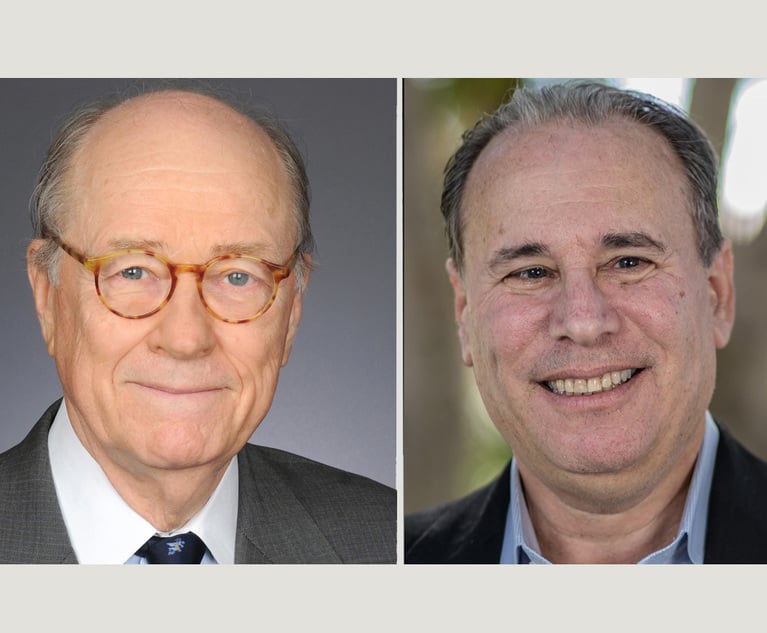 Lawrence W. Newman, left, and David Zaslowsky, right. Courtesy photos
Lawrence W. Newman, left, and David Zaslowsky, right. Courtesy photos Party-Appointed Arbitrators in International Arbitration: Criticized but Beloved
This articles discusses the continued vitality of the party-appointed arbitrator function and how it is treated by international arbitration users and their counsel in the face of guidelines and rules that have an impact on it.
May 22, 2024 at 10:00 AM
10 minute read
For a lawyer with a background of trying cases before juries in federal court, as Mr. Newman was doing in the early 1970s, learning about the practice in international arbitration of hearings before three arbitrators, with the contesting parties each appointing one, was a revelatory experience. Instead of planning for the eventuality of presenting to a federal civil jury of six members as triers of fact, counsel had to think, even before commencement of the proceedings, about the composition of a mini jury of one half of that trial court jury—and one that not only would serve as triers of fact but would also rule on issues of law. The power to appoint a tribunal member was a comfort and an opportunity, and of course, was also a power the exercise of which had to take into account that one's adversary also had the same power.
Time has passed since those earlier days, when the relatively few arbitrations compared to today were carried out with less scrutiny as to the qualifications of arbitrators and their appropriate role in proceedings. Today, with many more commercial and investment arbitrations worldwide, there is greater concern generally about the way such arbitrations are, or should be, conducted. Much is written and discussed in books, journals and conferences and in law school courses and made the subject of institutional rules and guidelines. The qualifications and role of arbitrators have not been spared this scrutiny and analysis.
This content has been archived. It is available through our partners, LexisNexis® and Bloomberg Law.
To view this content, please continue to their sites.
Not a Lexis Subscriber?
Subscribe Now
Not a Bloomberg Law Subscriber?
Subscribe Now
NOT FOR REPRINT
© 2025 ALM Global, LLC, All Rights Reserved. Request academic re-use from www.copyright.com. All other uses, submit a request to [email protected]. For more information visit Asset & Logo Licensing.
You Might Like
View All
Shifting Sands: May a Court Properly Order the Sale of the Marital Residence During a Divorce’s Pendency?
9 minute read
Tortious Interference With a Contract; Retaliatory Eviction Defense; Illegal Lockout: This Week in Scott Mollen’s Realty Law Digest


Court of Appeals Provides Comfort to Land Use Litigants Through the Relation Back Doctrine
8 minute readTrending Stories
Who Got The Work
J. Brugh Lower of Gibbons has entered an appearance for industrial equipment supplier Devco Corporation in a pending trademark infringement lawsuit. The suit, accusing the defendant of selling knock-off Graco products, was filed Dec. 18 in New Jersey District Court by Rivkin Radler on behalf of Graco Inc. and Graco Minnesota. The case, assigned to U.S. District Judge Zahid N. Quraishi, is 3:24-cv-11294, Graco Inc. et al v. Devco Corporation.
Who Got The Work
Rebecca Maller-Stein and Kent A. Yalowitz of Arnold & Porter Kaye Scholer have entered their appearances for Hanaco Venture Capital and its executives, Lior Prosor and David Frankel, in a pending securities lawsuit. The action, filed on Dec. 24 in New York Southern District Court by Zell, Aron & Co. on behalf of Goldeneye Advisors, accuses the defendants of negligently and fraudulently managing the plaintiff's $1 million investment. The case, assigned to U.S. District Judge Vernon S. Broderick, is 1:24-cv-09918, Goldeneye Advisors, LLC v. Hanaco Venture Capital, Ltd. et al.
Who Got The Work
Attorneys from A&O Shearman has stepped in as defense counsel for Toronto-Dominion Bank and other defendants in a pending securities class action. The suit, filed Dec. 11 in New York Southern District Court by Bleichmar Fonti & Auld, accuses the defendants of concealing the bank's 'pervasive' deficiencies in regards to its compliance with the Bank Secrecy Act and the quality of its anti-money laundering controls. The case, assigned to U.S. District Judge Arun Subramanian, is 1:24-cv-09445, Gonzalez v. The Toronto-Dominion Bank et al.
Who Got The Work
Crown Castle International, a Pennsylvania company providing shared communications infrastructure, has turned to Luke D. Wolf of Gordon Rees Scully Mansukhani to fend off a pending breach-of-contract lawsuit. The court action, filed Nov. 25 in Michigan Eastern District Court by Hooper Hathaway PC on behalf of The Town Residences LLC, accuses Crown Castle of failing to transfer approximately $30,000 in utility payments from T-Mobile in breach of a roof-top lease and assignment agreement. The case, assigned to U.S. District Judge Susan K. Declercq, is 2:24-cv-13131, The Town Residences LLC v. T-Mobile US, Inc. et al.
Who Got The Work
Wilfred P. Coronato and Daniel M. Schwartz of McCarter & English have stepped in as defense counsel to Electrolux Home Products Inc. in a pending product liability lawsuit. The court action, filed Nov. 26 in New York Eastern District Court by Poulos Lopiccolo PC and Nagel Rice LLP on behalf of David Stern, alleges that the defendant's refrigerators’ drawers and shelving repeatedly break and fall apart within months after purchase. The case, assigned to U.S. District Judge Joan M. Azrack, is 2:24-cv-08204, Stern v. Electrolux Home Products, Inc.
Featured Firms
Law Offices of Gary Martin Hays & Associates, P.C.
(470) 294-1674
Law Offices of Mark E. Salomone
(857) 444-6468
Smith & Hassler
(713) 739-1250






